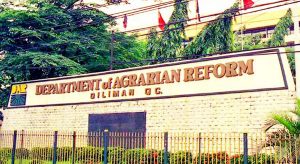Marcos agrarian reform plan expected to unlock farm productivity

By Luisa Maria Jacinta C. Jocson, Reporter
THE administration’s plan to provide relief on debt incurred by agrarian reform beneficiaries is expected to provide a boost to farm productivity, according to analysts.
“This is a step in the right direction because debt condonation will cause farmers to invest more in their land and expand the rural leasing market to promote land consolidation via lease because agrarian reform beneficiaries who have unpaid debts to the government cannot sell or lease their lands,” Foundation for Economic Freedom President Calixto V. Chikiamco said in a Viber message.
President Ferdinand R. Marcos, Jr. announced in his first State of the Nation Address on Monday that he intends to issue an executive order imposing a one-year moratorium on agrarian reform beneficiaries’ amortization and interest payments on land.
“Agrarian reform is not only about acquisition, but also about support services and distribution… the civil society organizations also support this because it will unburden the farmers of their dues and be able to focus on improving farm productivity,” he said.
“A moratorium will give the farmers the ability to channel their resources in developing their farms, maximizing their capacity to produce, and propel the growth of our economy,” he added.
Mr. Marcos also said that Congress must also pass a law that will emancipate agrarian reform beneficiaries (ARBs) from the agrarian reform debt burden, via amendments to Section 26 of Republic Act No. 6657.
“In this law, the loans of agrarian reform beneficiaries with unpaid amortization and interest shall be condoned,” he said.
“Agrarian reform beneficiaries who are still to receive their awarded land under the comprehensive agrarian reform program shall receive it without any obligation to pay any amortization,” he added.
The condonation plan covers over P58 billion in loans taken on by 654,000 ARBs and 1.18 million hectares of awarded land.
A total of 52,000 hectares of unused agricultural land owned by the government will also be distributed to landless war veterans; landless surviving spouses and orphans of war veterans; landless retirees of the Armed Forces of the Philippines and the Philippine National Police; and graduates of agriculture programs who are landless.
“The call of the times is for the infusion of fresh and new blood in the agricultural sector. We need a new breed of farmers equipped with modern agricultural technology able to engage in sustained scientific farming that will not only increase farm yields, but also resilience in the face of climate change,” Mr. Marcos added in his speech.
According to Mr. Chikiamco, debt condonation should be packaged with other reforms or amendments to the Comprehensive Agrarian Reform Law.
He said that the government should also convert all certificates of land ownership awards into simple titles and increase the land retention limit.
“Why do we need to increase the land retention limit from five hectares to 24 hectares? Because 24 hectares is the minimum viable size for commercial farming or agribusiness. The optimal state is to also allow consolidation via ownership, rather than leasing alone. While leasing will lead to land consolidation, the downside is that (those leasing) will tend to over fertilize the land since they don’t own it. Overfertilization will lead to lower productivity of the land in the long term,” he added.
Mr. Chikiamco also proposed removing the requirement for Department of Agrarian Reform clearances on all agricultural land transfers as monitoring of land retention limits should be done by the Land Registration Authority, which has the necessary database to do so.
Federation of Free Farmers Leonardo Q. Montemayor said that Mr. Marcos’ agrarian reform proposals are a significant part of the administration’s approach to the agriculture industry.
“It shows in his thinking that the two go together. The problem is that our economists and intellectuals in the past years or so always see agrarian reform as contrary to agricultural growth and productivity. The President is saying he’s putting the two together,” he said in a phone interview.
Mr. Montemayor said that he hopes Mr. Marcos will extend debt condonation to future farmers as well.
“I hoped he (goes) all the way. Not just condone the past, but the current and future. Amortization payments should not be a bar to them getting the title. The impact on farmers is they will be (confident) knowing they can own the land they are tilling. If you are a tiller, you have a stronger motive to maximize work on the farm,” he added.
On the distribution of unused land, Mr. Montemayor said it was vital that support services are given to landowners.
“It’s not enough to give them just land. There have to be support services and financing to buy basic tools and equipment. They have to be supported, not just in giving them land but giving them assistance,” he added.




